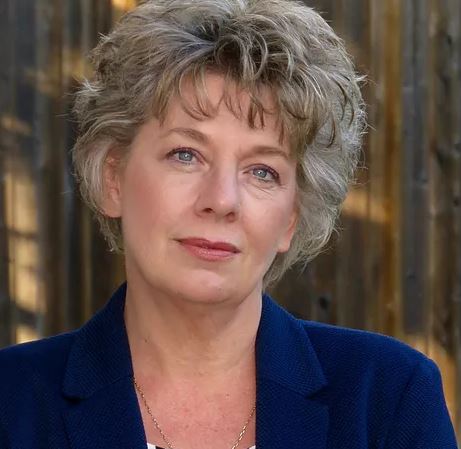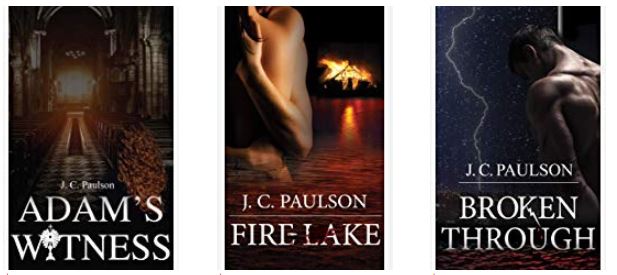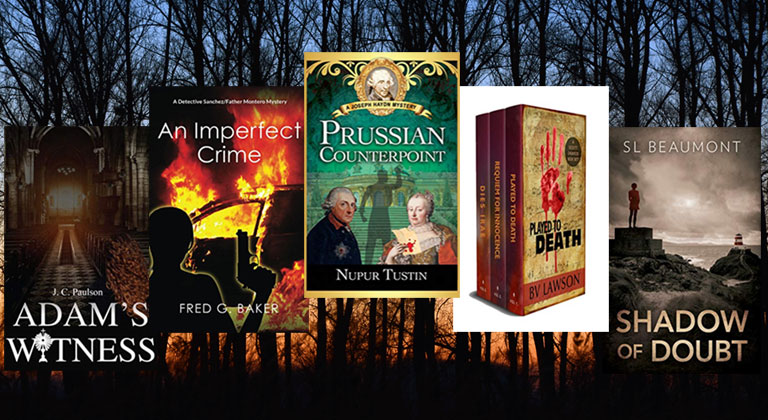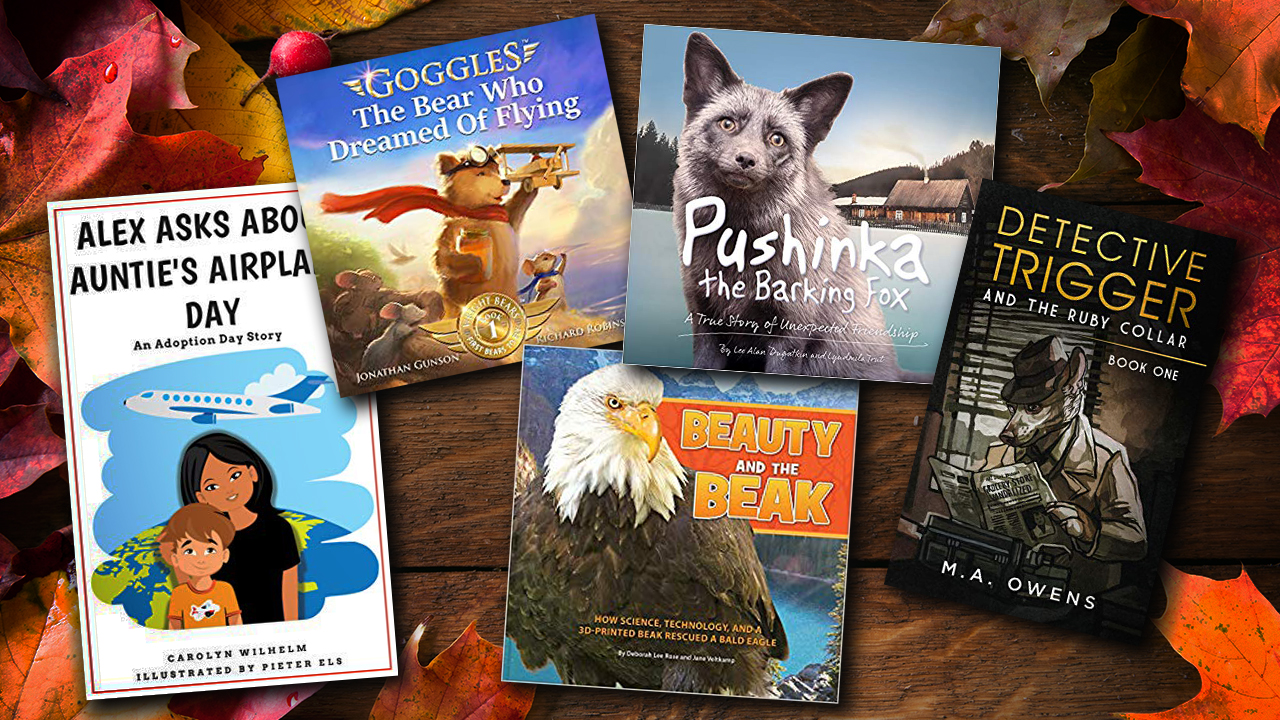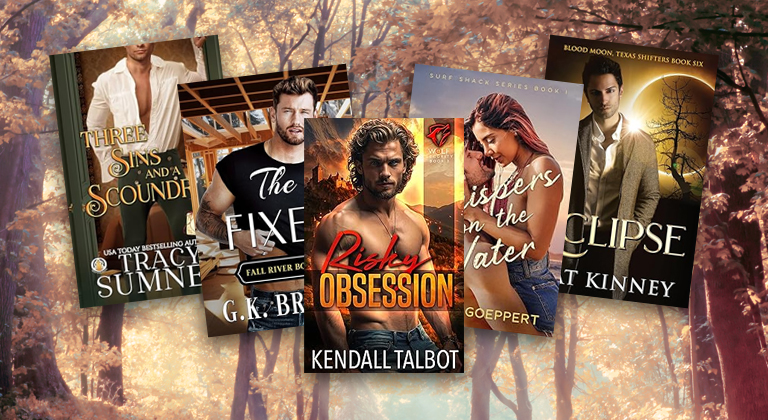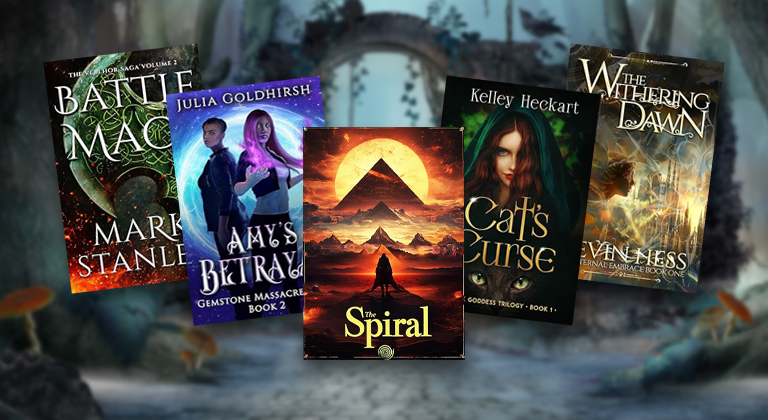Author Spotlight Interview: J.C. Paulson
This week we continue our series of Author Spotlight interviews by speaking with Canadian mystery writer J.C. Paulson, author of Adam’s Witness and two more titles in the Adam and Grace series. Hailing from the prairies of Saskatchewan, Paulson’s writing blends the crisp prose of her journalistic background with the optimistic promise of a satisfying ‘ever after’.
HG: I’ll start with the basics! Who is JC Paulson? When you’re not crafting mysteries, what do you do? Where do you live? How do you take your coffee? How do you describe yourself?
JCP: Right. How long would you like me to go?
HG: Longer than a Tweet, but shorter than Atlas Shrugged?
JCP: I can handle that! I’ve been a writer for my entire career. I started by writing ad copy — needed a job! and I did like it — before becoming a journalist, first with the daily paper in my city and then other publications. I’m still doing that, along with book editing, as a freelancer. I suppose my background is obvious in my books; I tend to write about social issues, mixing them with mystery and love; and one of my MCs, Grace, is a journalist. I made that leap from fact to fiction a few years ago. I had a story in my head — Adam’s Witness — that I just had to actually write down.
I live in the middle of the Canadian Prairies, in the province of Saskatchewan, which is a much more diverse place than people normally think. Beautiful lakes and forests, along with the cropland that many associate with the prairies. People may also think my hometown, Saskatoon, the main location in my books, is a teeny place, but it’s actually not all that small, with a census area of well over 300,000. Not a village. Not a metropolis. Hot in summer, very cold in winter.
Among my major addictions is lattes. Maaan, I could have two of those a day — large ones! — but I try to behave myself. I love coffee. And good wine. And tall, dark, handsome, intelligent and consent-seeking men, while I’m at it! Well, one in particular. I’m very happily married, and count myself incredibly lucky to be so.
So, a thing I’d like to share. This fiction thing was born out of a really rotten time in my life. I’d lost a job I loved, and soon after learned my father was very ill. Several other things happened at more or less the same time, and I felt I was losing myself in this morass of sadness and loss. Very bad insomnia was part of it. One night, I woke up at 3 a.m. as usual, but Adam and Grace and this plot was rolling around in my head. I thought I’d never remember it the next morning; but I did. It, in a way, saved my life, or at least, temporarily, my sanity. I’m not a person who tends to believe in strange mystical things, but I really believe my brain somehow intervened that night. It was bizarre. Then of course I was hooked. I’ve written two more novels (published) and have a fourth on the way.
I suppose I feel driven, now, to impose my ‘messages’ on an unsuspecting public! Can’t seem to help it. I love to write, and really do little else. Everything I do seems to lead back to that, whether I’m researching, interviewing, studying peeps, having conversations. Cleaning the house, and ruminating on my next plot point. Discussing stuff with hubs, who tries not to roll his eyes and is really a lot of help with sorting out difficult bits with the books. Obsessed, I suppose. I do manage to have a shower every morning, though!
HG: I TOTALLY get that. Adam’s Witness was your first book – tell me more about how it came to you, especially in that context.
JCP: Well, I have some imagination, but that’s not where the basic story lines come from. In the case of Adam’s Witness: years earlier, the case of the gay choir being booted from a cathedral (the one in the book is fictional) actually happened, and it made me furious.
I wrote a column about it for the paper, which had enormous readership and feedback. And I thought, how badly could that have gone? People were angry and upset on both sides. Ergo, the plot. Which is otherwise entirely fiction. I needed protagonists, of course.
Adam Davis, the detective sergeant in my stories, is an amalgam of several men, one of them a police officer I knew many, many years ago. He had been shot on the job, and had terrible PTSD as a result. I, too, have a bit of that, and I think I ‘get’ it. So that’s his ‘fatal flaw’ in a sense. It motivates him, and destroys him. It makes a beautiful, intelligent and effectual person human, to me. And I see myself in him, sometimes, as much as in Grace, although of course she is female and a journalist.
She’s also a bit of an amalgam of women journalists I know and respect. She’s much tougher and smarter than I am, but she does have my dumb sense of humor. And very unusual coloring, based on some of my family members. I also wanted to write something people might read; I didn’t want to just write a sermon. So, I’ve set up the novels as mysteries/police procedurals. In addition, the human relationships and the intense romance are important to me; they also act as foils. The way Grace and Adam, and Bruce and James, treat each other is respectful, which is often not the way people behave. I’ve tried to make them fairly realistic, but I also admit they are symbolic, as well.
HG: Let’s talk about when the writing bug first hit you long, long before. When did you first put pen to paper? What was the first thing you ever wrote?
JCP: EEP! I don’t even know. I was very small, maybe five or six?
In Grade 6, I knew I wanted to be a writer, and decided if I wanted to make a living, it probably had to be journalism. My cousin and I decided to write a teenage romance when we were about 12 or 13. It wasn’t all that bad, actually!! The first thing I ever had published, which kind of seems appropriate now, was a book review when I was 16. Lots of poems (mostly bad) over the years. Lots of short stories. Waaay more articles than I could possibly count. My mother taught me to read when I was possibly too young, in two languages. I guess that love of reading stuck, and I wanted to write as well as read as I grew.
HG: Tell me about the journalism! You said you moved into writing to write about hopeful things. Tell me about your career as a journalist. How did you get into it? What were your experiences?
JCP: I’m not sure ‘hopeful’ exactly. Let’s say trying to solve some of the issues, maybe.
I originally wanted to be a war correspondent, until I realized I was much too chicken for that.
After my university degree, I did some journalism school. I started as a general reporter, but quickly got moved into business reporting, and ended up as business editor. From there, went to arts for several years; I had a background in classical music and theater. Did some crazy hours in that department, reviewing many, many acts. Also covered the city editor for years, whenever he or she needed a holiday. Later, I served as the editor of an agricultural newspaper.
Now, I write for a large number of papers and magazines. So many experiences! One big one was organizing the entire newsroom to cover Canada’s biggest music awards, the JUNOS. Months of late hours and talking to Canada’s musical stars, including a trip to Toronto which I have to admit blew my mind; I met so many huge music people. I’ve interviewed some very cool folks, like Jim Cuddy of Blue Rodeo, B.B. King, Bob Newhart, tons of jazz greats. It was exciting, but really exhausting!
HG: That’s SO cool!
JCP: Aw, thanks! Do I sound braggadocious? GAH I hope not!
HG: Definitely not! Okay, so onto the writing. Are you a plotter, or a pantster? Do you plan things out beforehand? I imagine that might be important with a mystery.
JCP: Believe it or not . . . pantser!
Well, partly. I have a plot, yes, and a basic idea of where the whole thing is going. I often change up the minor villains, though (usually not the main one) based on how the story goes. Sometimes a character speaks to me, and I give him or her more to do, good or bad. But often the clues emerge as I go along. I must say, I don’t know how anyone can start writing anything without a basic plot sketched out. I wouldn’t be able to begin without more or less knowing the point and the ending!
But I do pants along as the characters and the story develop.
HG: I think that’s a fair balance between the two. Okay, tell me about the writing process! Where do you write? Do you have space set aside? Are you a hipster-in-Starbucks person? Do you listen to music? Drink rum and orange? Smoke endless cigarettes?
JCP: Yes, I have a little space tucked away off the family room that sort of serves as an office. I’d love to do the hipster writing-in-a-cafe thing, but I can’t concentrate. I prefer it to be fairly quiet; and besides, if I’m in public, I also can’t help people-watching. So music is often in the background, but playing softly. I have had a few rum and oranges in my life (ha!) but not while I’m writing. My tipple is wine. Mostly coffee. Smoothies for energy. Ex-smoker! Yay to the ‘ex’ part, boo to the ‘smoker’ part.
HG: Do you have any rituals to get you in the zone? How long does it take you to write a novel, usually?
JCP: I’m ritual-free. If I have the time and energy, I just get at it. Life can be so busy, you have to grab writing time whenever you can. I think it takes me about eight months to write a novel. The first one took much MUCH longer, in part because it was the first, and in part because there were so many family issues at the time. Then, of course, there’s the editing, cover design and marketing (eep), so by the time it comes out it’s about 11 months. I am profoundly hoping to bring that down; perhaps six months for writing and two to get it whipped into shape.
HG: Life gets in the way! I share your pain. So, who are some of your favorite books and authors?
JCP: It does. Ouch. OOOH, don’t get me started. I’m a huge Barbara Kingsolver fan: she of Poisonwood Bible fame. Also loved Flight Behavior and Unsheltered, among others. On the mystery side, Dorothy Sayers‘ Lord Peter Wimsey novels; I learned that yes, you can have relationships in mystery novels. I love P.D. James and Ann Cleeves (Shetland series), and also Ruth Rendell. Otherwise, I also love reading Bill Bryson, especially At Home. Among the biggies/classics . . . John Steinbeck (Cannery Row! Grapes of Wrath!) And Canadians Michael Ondaatje (especially The English Patient), Margaret Atwood, Guy Vanderhaeghe (The Englishman’s Boy, The Last Crossing — he lives in the same city I live in! adore him), and Robertson Davies, especially the two main trilogies. I should really stop now.
HG: Final couple of questions – what are you working on right now?
JCP: I’m writing the fourth book in the Adam and Grace series, working title Griffin’s Cure. I’m about 22K into it. I’m investigating the chiral properties of matter, which is not entirely in my comfort zone, but I’m learning! I’m also obsessed. Can’t stop thinking about it, researching it, writing it. But that definitely beats the alternative. I’ve also started on a historical fiction novel — kind of a western, but need to do a lot more research before I can move on that one. Eep. How did people get across Canada in the 1880s? Realistically? Reading history now.
HG: What’s the best advice you’ve ever received about writing?
JCP: Best advice. Hmmm. I’ve had so much good advice, it’s hard to choose one thing. Don’t head jump, limit your POVs, show don’t tell (to the extent possible), make sure your chapters end with a bang. I think, though, the main thing is to write what you’re passionate about. Tell the stories you have to tell. Grab the courage to stick yourself out there. It’s always got to be better, likely monstrously so, than writing by rote.
HG: Finally, where else can people find you?
JCP:
Website
Facebook
Twitter
Pinterest
Instagram


